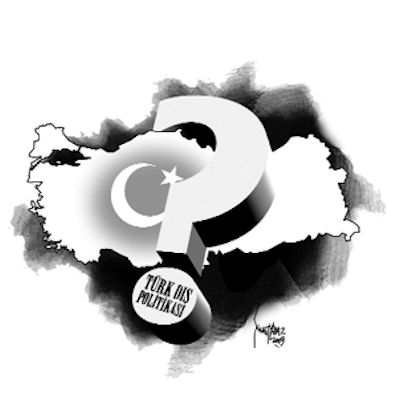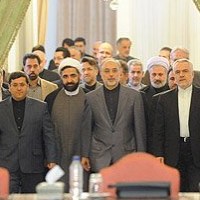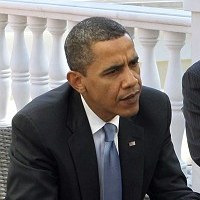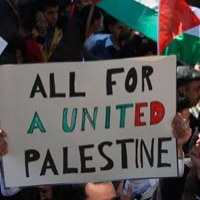![]()
Mon, Oct 10, 2011 | Turkey Analyst, vol. 4 no. 19 | By Halil M. Karaveli
Turkey’s Foreign Policy “Revolution”: Assuming a “NeoConservative” Mission in the Middle East?
This article was first published in the Turkey Analyst (www.turkeyanalyst.org), a biweekly publication of the Central Asia-Caucasus Institute & Silk Road Studies Program Joint Center. © Central Asia-Caucasus Institute & Silk Road Studies Program Joint Center, 2011.
The Arab spring has catapulted democracy and human rights to the top of Turkey’s stated foreign policy priorities. Turkey’s assumption of what almost amounts to a “neoconservative” foreign policy mission in the Middle East is far from risk-free. Ankara was recently served a first, dire public warning from Iran. The greatest danger for Turkey is that its rulers indulge in the conviction that they are on the right side of history, in tune with the forces of change. The new dictum of Turkish foreign policy might be labeled “freedom at home, freedom abroad”, but the AKP government’s celebration of “freedom” has a hollow ring to it. It may be that Erdoğan is in tune with the aspirations of the Arab street, but he is not paying close enough attention to the simmering anger on Turkey’s Kurdish streets.
Background
Turkey and Iran have been strategic rivals for centuries. Recently, however, Turkey had sought to improve its relationship with its eastern neighbor. Commercial ties have deepened and Turkey had, not least, broken ranks with its Western allies over the issue of Iran and its nuclear capability; Ankara opposed U.N. sanctions on Iran, and in May 2010 Turkey, Brazil and Iran brokered a deal that was clearly intended to relieve some of the international pressure that was building up against Iran. Since then, however, Turkey has taken the decisive step to join NATO’s missile defense shield that is being deployed precisely with the intention of warding off any potential Iranian missile threat to the Middle East and Europe. Turkey has also taken its hands off its erstwhile friend Syria that is a close Iranian ally, and has begun to court Egypt, with which it desires to establish a strategic partnership. That such a partnership would aim at reining in Iranian ambitions in the Middle East can be taken for granted; indeed Turkish Prime Minister Recep Tayyip Erdoğan specifically spoke out in defense of secularism when he recently visited the countries of the Arab spring in North Africa. Erdoğan’s remarks in Cairo, where he extolled the virtues of secularism, exhorted the Egyptians to enshrine secularism in their new constitution and challenged anyone to prove that secularism is against the nature of Islam, could not have been farther from the Iranian vision.
On Saturday, October 8, Turkey was served a first, dire public warning from Iran. In an interview with the semi-official Mehr news agency, a military adviser to Iran’s supreme leader Ayatollah Ali Khamenei, Major-General Yahya Rahim-Safavi, assailed Turkish Prime Minister Erdoğan. The Iranian leader’s adviser impressed that Turkey must radically rethink its policies on Syria, the NATO missile shield and about promoting secularism in the Arab world — or face trouble from its own people as well as neighbors. Erdoğan’s invitation to the countries of the Arab spring to adopt Turkish-style democracy and secularism was deemed both “unexpected” and “unimaginable.” What was particularly unexpected and unimaginable was Erdoğan’s call for secularism: “This fact was unexpected and unimaginable since the Egyptian people are Muslims”, stated the Iranian supreme leader’s military adviser, who called it a “strategic error”.
There can be no doubt that Turkey’s decision to deploy a radar station as part of NATO’s missile shield hurts Iran in strategic terms. Ankara is accused of serving U.S. interests:”The behavior of Turkish statesmen toward Syria and Iran is wrong and, I believe, they are acting in line with the goals of America,” the Iranian military official went on. “I think the Turks are treading a wrong path. It might very well be that the path was set for them by the Americans,” suggested the Iranian general.
In strategic terms Turkey is indeed — once again — treading the same path as the United States, although Ankara’s anti-Israeli stance sets it apart from Washington’s sensibilities and priorities. Yet even though the Iranians feign surprise, the fact that Turkey seeks to balance and counter Iranian influence is less remarkable, given the geopolitical heritage, than it would seem against only the backdrop of the — by now abandoned — Turkish attempts to court Iran. But the Iranians, presumably, did not expect Erdoğan to mount a challenge to them in ideological terms; his strongly worded plea for secularism must have genuinely rattled the Iranians; in any event, the specter of a leader who enjoys wide popularity on the “Arab street” and whose Muslim credentials are impeccable calling for secularism should be ideologically disquieting for those who nourish the hope that the Arab spring is going to pave the way for an Islamist awakening in the Middle East.
Implications
Sedat Laçiner, an influential Turkish foreign policy strategist who is close to the AKP, recently wrote that what has taken place is nothing less than a “revolution” in Turkish foreign policy. He observed that non-interference in the internal affairs of others has been a near-sacred rule of Turkish foreign policy, a tradition from which Erdoğan has departed by dispensing advice to Egyptians, Libyans and Tunisians and not least by stating that Syria is an “internal affair” for Turkey. Indeed, the Syrian example makes clear that the AKP government has by now to all intents and purposes abandoned the much vaunted “zero problems with neighbors” doctrine. Laçiner also observes that the quality of its neighbors’ democracies — or rather lack thereof — used to be of little concern for Turkey.
What Turkish pro-government analysts and commentators have in mind when they make such observations is the ways of the old, Kemalist regime; for instance, Kenan Evren, the general who took power in a coup in 1980, befriended and coddled Pakistan’s dictator Zia ul-Haq. What is conveniently overlooked is that Erdoğan had until very recently remained faithful to this foreign policy tradition that cared little about democracy: Erdoğan hastened to congratulate the Iranian president Mahmoud Ahmedinejad upon his victory in the fraudulent presidential election in 2009, and he went out of his way to defend Sudanese president Omar al-Bashir against accusations of complicity in genocide; he also has a historical footnote reserved for himself as the last recipient of the Qaddafi Human Rights prize, which he was awarded in December 2010.
It is the Arab spring that has catapulted democracy and human rights to the top of Turkey’s — stated — foreign policy priorities. As Laçiner writes, it is Turkey’s responses to the Arab spring that serve to demonstrate that Turkish foreign policy has shifted from “rigid realism and pragmatism” to an “ethical, indeed idealist” line. That is obviously a self-celebratory narrative that glosses over the all-apparent inconsistencies. Yet beneath the rhetorical surface, there is nonetheless continuity: Turkey’s advocacy for freedom in the wake of the Arab uprisings is in fact another expression of unsentimental realism and pragmatism. Turkey had sought to maximize its influence in its neighborhood by maintaining good relations with the rulers, by having zero problems with them; now, as the ruled have gained a say with the Arab spring, it makes good sense in power terms to champion freedom, to stay tuned to the Arab street. Indeed, the AKP’s own history would have taught its leader that freedom is an unrivalled lever for power.
Turkey’s assumption of what would almost seem to amount to a “neoconservative” foreign policy mission in the Middle East — with calls for regime change, advocacy for liberty, human rights and secularism — has been just as unexpected as the former Islamists’ conversion to conservative democrats was when the AKP was founded a decade ago. The AKP came to power because the Islamists remade themselves, embraced liberal values — and befriended Europe and the U.S. — championing those values against a state establishment whose authoritarianism was hopelessly out of touch with a vibrant society. It is tempting for the ruling party of an ascendant Turkey to apply that lesson to a wider regional context. Turkey is not afraid of promoting democracy and human rights, hold establishment analysts, precisely because it has solved its own “identity crisis”, and put its own house in order; the observation of strategist Laçiner that “we feel free to act, since our prisons are no longer torture chambers” offers a glimpse into the mindset of the Turkish ruling elite. Yet, he does add the caveat that “liberty and leadership also come at certain risks and costs”. That is indeed presumably one reason why Prime Minister Erdoğan has come to deploy a rhetoric in the countries of the Arab spring that has led the Iranians to accuse Turkey of acting in concert with the United States; just like the case was on the internal front a decade ago, the AKP recognizes that U.S. support is critical to ward off challenges to its power; today that challenge emanates from those countries, Iran and Syria, that are poised to exploit Turkey’s Kurdish problem.

Turkish Headline: "Iran finally warned: if Turkey does not change its course, you are serving the Zionist regime".
Conclusions
Turkey’s foreign policy used to be guided by the dictum “peace at home, peace in the world”, once pronounced by the country’s first president, Kemal Atatürk. “Peace” at home always had a hollow ring to it, since it was secured at the prize of a severe repression of not least the Kurds; yet the Kemalist republic remained haunted by the constant fear that its internal frailties — above all the ethnic split — was going to be exploited by hostile neighbors and others, which it was. That was indeed one chief reason why Atatürk — long before foreign minister Ahmet Davutoğlu coined the dictum — in all but name prescribed zero problems with neighbors as the guideline of a foreign policy that saluted “peace in the world”. The new dictum of Turkish foreign policy might be labeled “freedom at home, freedom abroad”, even though the AKP government’s celebration of “freedom” does have a hollow ring to it, just like the Kemalist celebration of “peace” once had; the clampdown on Kurdish politicians, elected officials and non-violent activists continues unabated, with nearly four thousand having been arrested since April 2009.
Turkey’s image will suffer if it is perceived as being hypocritical; yet, what poses a real danger is that its rulers indulge in the conviction that they are on the right side of history, in tune with the forces of change, having offered, as they see it, enough freedom to satisfy the Kurdish population, enabling Turkey to safely assume an assertive foreign policy mission. However, the country’s identity crisis is far from being settled. It may be that Erdoğan is in tune with the aspirations of the Arab street, but he is not paying close enough attention to the simmering anger on Turkey’s Kurdish streets.
Halil M. Karaveli is Senior Fellow and Managing Editor of theTurkey Analyst at the Central Asia-Caucasus Institute and Silk Road Studies Program Joint Center.



 RSS
RSS











Turkey’s Foreign Policy “Revolution”: Assuming a “NeoConservative” Mission in the Middle East? | Mid http://t.co/U52Hw8Gm
Turkey’s Foreign Policy “Revolution”: Assuming a “NeoConservative” Mission in the Middle East? | Mid http://t.co/U52Hw8Gm